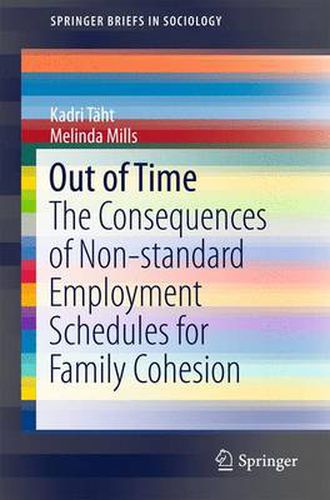Readings Newsletter
Become a Readings Member to make your shopping experience even easier.
Sign in or sign up for free!
You’re not far away from qualifying for FREE standard shipping within Australia
You’ve qualified for FREE standard shipping within Australia
The cart is loading…






This title is printed to order. This book may have been self-published. If so, we cannot guarantee the quality of the content. In the main most books will have gone through the editing process however some may not. We therefore suggest that you be aware of this before ordering this book. If in doubt check either the author or publisher’s details as we are unable to accept any returns unless they are faulty. Please contact us if you have any questions.
This pioneering work aims at understanding the impact of non-standard (evening, night, weekend) working time on family cohesion, meaning parent-child interaction, partnership quality and divorce or partnership dissolution. ‘Out of time - the Consequences of Non-standard Employment Schedules for Family Cohesion’ is the first work to treat this important topic in a cross-national, comparative way by using data from two large comparable surveys. The impact of work in non-standard schedules on workers can be divided into individual and social consequences. Research so far has shown the clear individual effects of these schedules, such as increased stress levels and sleeping and physical disorders. There is less clarity about social consequences. Either no or positive effects of these types of schedules on workers and their families are found, or a significant negative impact on the relations between the workers and others, especially other members of the family is shown in research results. This Brief compares the Netherlands and the United States of America, countries that both show a high prevalence of non-standard schedule work, whereas both operate in very different institutional and welfare regime settings of working time regulation. By combining both quantitative and qualitative data, the authors are able to provide generalized views of comparative surveys and challenging those generalizations at the same time, thus enabling the reader to get a better understanding and more balanced view of the actual relationship between non-standard employment schedules and family cohesion.
$9.00 standard shipping within Australia
FREE standard shipping within Australia for orders over $100.00
Express & International shipping calculated at checkout
This title is printed to order. This book may have been self-published. If so, we cannot guarantee the quality of the content. In the main most books will have gone through the editing process however some may not. We therefore suggest that you be aware of this before ordering this book. If in doubt check either the author or publisher’s details as we are unable to accept any returns unless they are faulty. Please contact us if you have any questions.
This pioneering work aims at understanding the impact of non-standard (evening, night, weekend) working time on family cohesion, meaning parent-child interaction, partnership quality and divorce or partnership dissolution. ‘Out of time - the Consequences of Non-standard Employment Schedules for Family Cohesion’ is the first work to treat this important topic in a cross-national, comparative way by using data from two large comparable surveys. The impact of work in non-standard schedules on workers can be divided into individual and social consequences. Research so far has shown the clear individual effects of these schedules, such as increased stress levels and sleeping and physical disorders. There is less clarity about social consequences. Either no or positive effects of these types of schedules on workers and their families are found, or a significant negative impact on the relations between the workers and others, especially other members of the family is shown in research results. This Brief compares the Netherlands and the United States of America, countries that both show a high prevalence of non-standard schedule work, whereas both operate in very different institutional and welfare regime settings of working time regulation. By combining both quantitative and qualitative data, the authors are able to provide generalized views of comparative surveys and challenging those generalizations at the same time, thus enabling the reader to get a better understanding and more balanced view of the actual relationship between non-standard employment schedules and family cohesion.